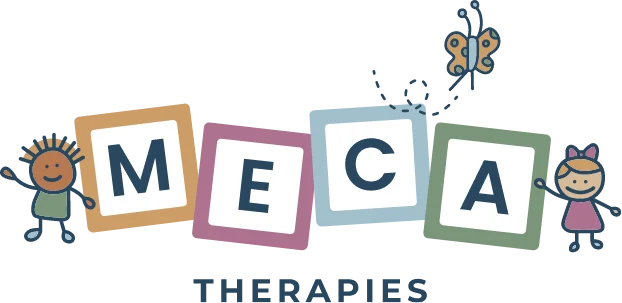EARLY Intervention PROGRAM
Early childhood support for a brighter future.
For Infants & Toddlers (0-3 Years)
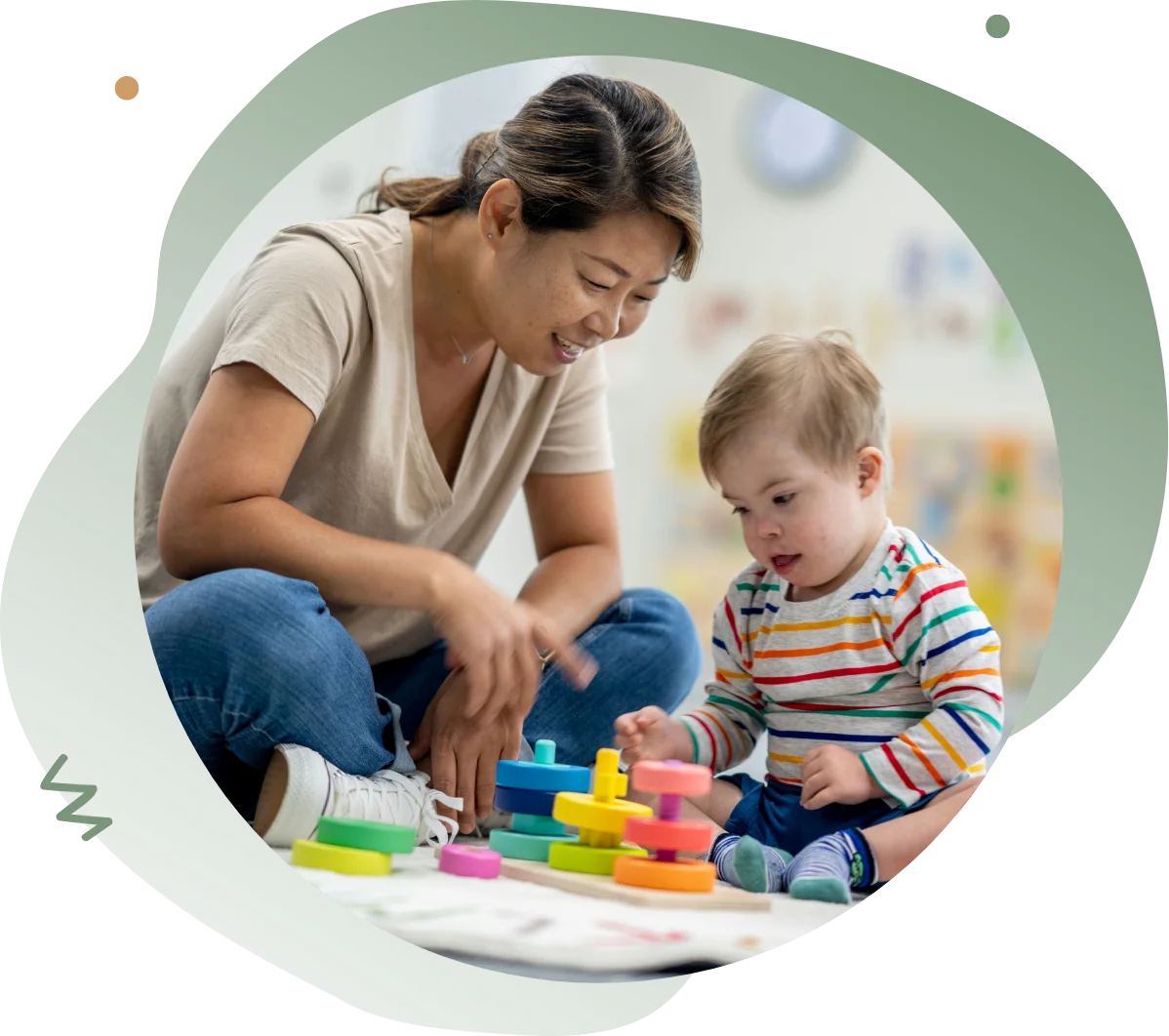
Help your children thrive with early intervention.
At MECA Therapies, we believe in supporting your child’s development from the very beginning. Our Early Intervention Program offers free, personalized care to help children from birth to age 3 reach important developmental milestones.
Whether your child is showing signs of delay or has a diagnosed condition, our licensed therapists and specialists provide therapy, education, and coaching to support your child—and your whole family—every step of the way.
All services are free to New Mexico families, funded through the New Mexico Family Infant Toddler (FIT) Program.
Who we help
Our team supports children with a wide range of needs, including:
- Speech and language delays
- Feeding and swallowing difficulties
- Physical and motor delays
- Developmental delays or regressions
- Neurologic/neuromuscular conditions
- Sensory integration challenges
- Autism spectrum disorders
- Support for babies in the NICU
- Nursing coordination & pediatric counseling
- And much more
If you’re unsure whether your child qualifies, we offer free developmental screenings and can help guide you through the next steps.
Developmental Milestones
Understanding your child’s developmental journey.
Every child grows at their own pace, but reaching key developmental milestones on time is important for long-term success. From speech and language skills to motor development and social interaction, early signs can indicate whether a child may need extra support.

1-3 Months
Your baby should be able to:
- React to sudden movements or noises
- Follow moving objects with their eyes
- Begin smiling when you play with them
- Grasp small objects placed in their hand
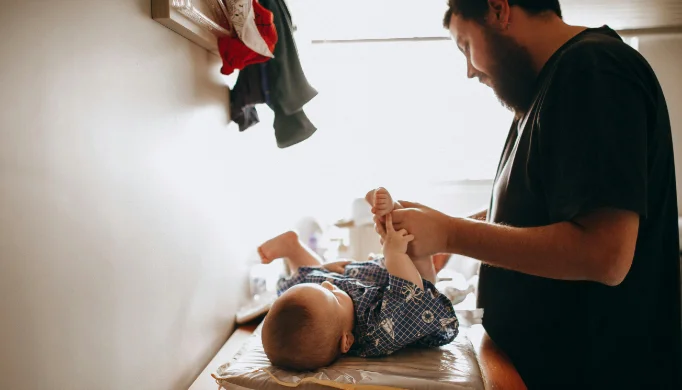
3-6 Months
Your baby should be able to:
- Lift their head and chest when on their tummy
- Roll over
- Reach and hold objects
- Recognize familiar objects and people
- Laugh or chuckle

6-9 Months
Your baby should be able to:
- Sit by himself/herself when placed in a sitting position
- Make sounds such as “bab,” “gugu,” or “didi”
- Use crying to show different needs (hunger, anger)
- Distinguish strangers from family
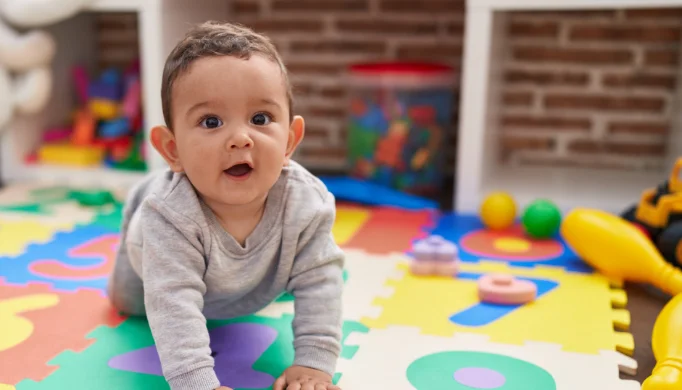
9-12 Months
Your child should be able to:
- Pull himself/herself to a sitting and/or standing position
- Crawl
- Understand simple words (“mommy,” or “bye-bye”), and know their own name
- Pay attention to simple commands, such as “Give it to me”

12-15 Months
Your child should be able to:
- Walk by himself/herself (by holding onto furniture or not)
- Feed himself/herself using utensils
- Say two or more words besides “mama” and “dada”
- Understand more of what is being said to them
- Play by himself/herself (but they also like to play with others)

15-18 Months
Your child should be able to:
- Walk by himself/herself; they can often walk upstairs with help
- Imitate simple actions and words
- Point to simple pictures such as dog, baby, and car
- Ask for help when needed

18-24 Months
Your child should be able to:
- Walk well, begin running, and climb stairs
- Start enjoying moving to music
- Combine two or more words (“Play ball” or “Me want cookie”)
- Say “No” to bedtime, certain foods, and simple requests

24-30 Months
Your child should be able to:
- Jump, run, kick a ball, walk up and down stairs
- Feed himself/herself well with a spoon
- Help with dressing and undressing himself/herself
- Play with other children, usually for short periods of time
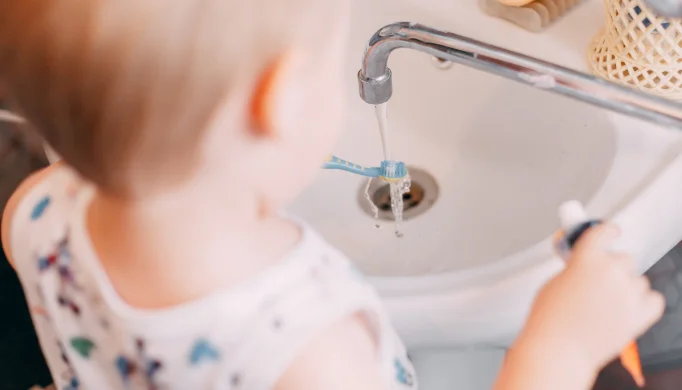
30-36 Months
Your child should be able to:
- Put their shoes on (no lacing)
- Brush their teeth with some help
- Say their first and last names
- Know the difference between “big” or “little,” and “boy” or “girl”
- Share, tell stories, and play pretend with other children
Not sure if your child is meeting their milestones?
Schedule a free screening to talk with one of our child development specialists.
Our Early Intervention Services
Building strong foundations through early intervention.

Pediatric Developmental Instruction
Building behaviors
for lifelong success.
Surround your child with the support they need to develop age-appropriate behaviors and skills. This family-centered service connects you with a professional who offers strategies to promote growth through everyday routines—helping your child learn, adapt, and thrive.
Early intervention developmental instruction is designed for infants and toddlers who struggle with:
Delayed Cognitive or Social Milestones – Trouble with playing, exploring, or showing interest in people and surroundings.
Difficulty Following Directions – Struggles to understand or respond to simple instructions or daily routines.
Limited Engagement or Interaction – Rarely makes eye contact, shares attention, or participates in back-and-forth play.
Challenges Learning New Skills – Has difficulty imitating actions, solving simple problems, or adjusting to changes.
Daily Routine Difficulties – Trouble participating in activities like mealtime, bath time, or getting dressed.
Pediatric Speech Therapy
Helping children
find their voice.
Early intervention speech therapy is designed for infants and toddlers who struggle with:
Speech Delays – Not meeting developmental milestones for babbling, first words, or sentences.
Language Disorders – Difficulty understanding and using language appropriately.
Social Communication Deficits – Struggles with interacting, making eye contact, or understanding social cues (common in autism).
Feeding & Swallowing Disorders – Trouble chewing, swallowing, or transitioning to solid foods.


Pediatric Physical Therapy
Building balance and mobility for life.
If your child is showing delays in movement or motor development, early intervention physical therapy can help them build the strength and coordination needed to catch up. Pediatric physical therapy focuses on improving gross motor skills, balance, posture, and mobility.
Early intervention physical therapy is designed for infants and toddlers who struggle with:
Delayed Motor Milestones – Not rolling over, sitting, crawling, or walking within typical age ranges.
Low Muscle Tone (Hypotonia) – Appearing floppy or weak, often struggling with head or body control.
Tight Muscles or Movement Limitations – Stiffness, poor range of motion, or asymmetrical movements.
Neurological Conditions – Physical challenges related to cerebral palsy, genetic syndromes, or developmental disorders.
Balance & Coordination Issues – Difficulty with stability, frequent falling, or awkward movement patterns.
Pediatric Occupational Therapy
Targeted therapy to develop essential life skills.
Some children struggle with everyday activities like eating, playing, or calming themselves. If you see this in your child, early intervention occupational therapy can help. Pediatric occupational therapy focuses on helping children develop the sensory, motor, and self-help skills they need for daily life.
Early intervention occupational therapy is designed for infants and toddlers who struggle with:
Sensory Processing Issues – Overreacting or underreacting to sounds, textures, lights, or touch.
Fine Motor Delays – Difficulty using hands for grasping, holding, or manipulating toys and utensils.
Feeding Sensitivities – Avoidance of certain textures, gagging, or trouble using fingers and utensils during meals.
Self-Regulation Challenges – Trouble calming down, adapting to changes, or managing big emotions.
Daily Living Skills – Delays in dressing, brushing teeth, or other age-appropriate routines.


Early Intervention Family Therapy
Helping families
grow together.
Strong families build strong futures. Family therapists partner with caregivers to work through challenges, improve communication, and support every member of the household. Through collaborative sessions and personalized guidance, you’ll feel more confident, connected, and equipped to help your child thrive.
Early intervention family therapy is designed for families navigating:
Emotional Stress or Strained Relationships – Ongoing tension, conflict, or difficulty managing emotions within the family.
Communication Breakdowns – Struggles to express needs, listen actively, or resolve disagreements constructively.
Uncertainty Around Child Development – Concerns about a child’s behavior or progress without a clear path forward.
Major Life Transitions – Adjusting to changes like new siblings, relocation, separation, or loss.
Caregiver Burnout or Exhaustion – Feeling overwhelmed or unsupported while managing a child’s needs.
Early Intervention Social Work
Every family deserves
an advocate.
Social workers support families facing life’s challenges—providing emotional guidance, crisis support, and access to vital community resources. With a focus on building stability and resilience, they help you create a safe and nurturing environment for your child’s growth.
Early intervention social work is designed to help families facing:
Emotional or Mental Health Challenges – Caregivers coping with anxiety, depression, trauma, or chronic stress.
Housing, Financial, or Safety Concerns – Urgent needs that affect a child’s environment and security.
Family or Relationship Conflict – Tension or instability that may disrupt a child’s emotional development.
Limited Access to Community Support – Difficulty finding and connecting to services like food, healthcare, or transportation.
Crisis Situations – Sudden events that require immediate support, coordination, and follow-up care.

Tailored Treatment
Care that's crafted for your child.
Every family’s journey is unique, and so is our approach to care. We’ll work with you to decide what’s best for your child and your routine. Plus, New Mexico covers these services as part of the Early and Periodic Screening, Diagnostic, and Treatment (EPSDT) benefit. This means No out-of-pocket- cost for New Mexico Families.
Access to a family service coordinator dedicated to supporting you and your child every step of the way.
Receive support
from our team of professionals.
Care where you are. Sessions can be provided to your child in-home, in the community, or at daycare.
See your child thrive.
Early intervention can make a lasting difference in your child’s development. If you have concerns about speech, motor skills, or sensory challenges, our expert team is here to help. Contact MECA Therapies today for a free evaluation and take the first step toward a brighter future.
Frequently asked questions.
Who is eligible to receive early childhood intervention services?
Children from birth to age 3 living in New Mexico may be eligible for early intervention services if they show signs of developmental delays or have diagnosed conditions affecting development. Eligibility is determined through a free evaluation.
How are referrals made?
Referrals can be made by parents, doctors, hospitals, child care providers, or anyone with concerns about a child’s development. Families can also contact MECA Therapies directly to request an evaluation.
What is an early intervention program?
An early intervention program provides therapy and support services to children under age 3 who have or are at risk for developmental delays. Services often include speech, physical, and occupational therapy, delivered in-home or in community settings.
What is developmental delay?
A developmental delay means a child is not meeting expected milestones in areas like speech, motor skills, social interaction, or learning. Early evaluation helps determine whether intervention is needed.
What are the symptoms associated with speech delay?
Can a child with developmental delays catch up?
Yes. With early intervention therapy, many children with developmental delays make significant progress and reach age-appropriate milestones over time.
When should I worry about speech impediments?
How do I know if my child needs speech therapy?
If your child has trouble speaking, understanding language, or being understood, a speech-language evaluation can help determine if pediatric speech therapy is needed.
Featured resources.
TESTIMONIALS FROM families + community members
"MECA Therapies has been great to the improvement of my son’s speech. He started the program with only approximately 39% intelligibility and after 1 month, I can understand over 75% of what he says."
David M.
Clinic Parent
"Before I brought my boys to MECA Therapies they had very little communication skills. Today both boys can voice their needs and wants and so much more. The therapists are angels in the way they helped my kids."
Melisa M.
Clinic Parent
"MECA Therapies has helped my son get more active by providing speech, physical, and occupational therapy. The therapist helped me as a mom understand and learn more about my son's needs and what I can do to help him reach goals."
Debora R.
Clinic Parent
"Since Cristian has been getting therapy with MECA we have seen a major improvement in all areas. His speech and attitude are probably where we have seen the biggest improvement. The staff has always been supportive and helpful. I have already recommended MECA to other families I know."
Erica C.
Clinic Parent
"Abraham has been receiving services from MECA since he was 3 years old. MECA has been very helpful in Abraham’s development throughout the years. I would definitely recommend MECA services to anybody who needs it. It has been a delightful experience."
Belinda B.
Clinic Parent
"James has been receiving OT to help him feel better in his environment. He enjoys going and is learning to tolerate hard tasks and feel successful."
Clinic Parent
"The staff at MECA has played an important role in our journey. They’ve been a part of our lives since before diagnosis and through transition to school. Starting school would have been very hard without the support of the MECA staff. We really appreciate all the help over the years!"
Mariam S.
Clinic Parent
Why Families Choose MECA Therapies
Accessible maternal health and pediatric therapy services for New Mexico families.
The largest early intervention provider in New Mexico.
MECA Therapies serves more families across New Mexico than any other early intervention provider. With decades of experience and a deep commitment to child development, we ensure that every child has access to high-quality therapy services, no matter their location or background.
One-stop care from pregnancy through childhood.
Unlike many providers that specialize in only one stage of life, MECA Therapies offers maternal health, early childhood intervention, and outpatient therapy under one umbrella. This continuity of care ensures there are no gaps in family support, from pregnancy through a child’s developmental years.
Focused on access and impact.
We’re committed to reaching families who need support the most—especially in underserved and rural communities across New Mexico. With flexible service models, bilingual providers, and partnerships that reduce barriers to care, we work to ensure that every child and parent has access—regardless of zip code or background.
Community-based, in-home, & virtual care options.
Quality therapy doesn’t have to happen in a clinic. That’s why we bring our services into homes, schools, daycares, and community spaces to make care accessible and effective for children and families. Virtual sessions are also available for added convenience.
How to get started.
Reach out with
your concerns.
Getting started is simple. Provide us with an overview of your concerns or challenges so our team can connect you with a specialist.
Receive a personalized assessment & plan.
Watch your
family thrive.
With expert guidance and compassionate support, your family will get the tools and resources needed to grow and succeed.
